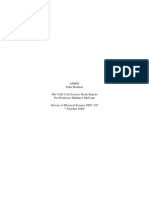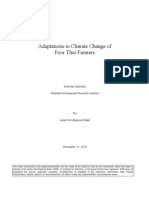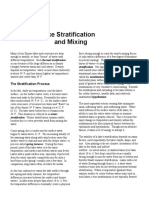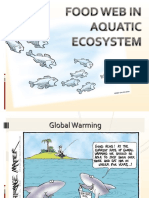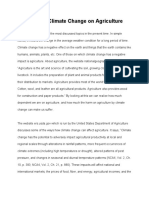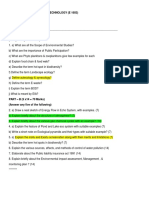0 ratings0% found this document useful (0 votes)
447 viewsThe Great Global Warming Swindle
The Great Global Warming Swindle
Uploaded by
U8x58This document provides a critique of the documentary "The Great Global Warming Swindle". It summarizes that the documentary makes misleading claims about the scientific evidence and causes of global warming. Specifically, it argues the documentary falsely claims that greenhouse gases do not cause warming, overstates the sun's influence on climate, and presents fabricated or distorted data. The document analyzes these claims and concludes that an overwhelming majority of climate scientists have rejected the views in the documentary as inconsistent with the evidence that human activity is the main driver of current global warming.
Copyright:
Public Domain
Available Formats
Download as PDF, TXT or read online from Scribd
The Great Global Warming Swindle
The Great Global Warming Swindle
Uploaded by
U8x580 ratings0% found this document useful (0 votes)
447 views2 pagesThis document provides a critique of the documentary "The Great Global Warming Swindle". It summarizes that the documentary makes misleading claims about the scientific evidence and causes of global warming. Specifically, it argues the documentary falsely claims that greenhouse gases do not cause warming, overstates the sun's influence on climate, and presents fabricated or distorted data. The document analyzes these claims and concludes that an overwhelming majority of climate scientists have rejected the views in the documentary as inconsistent with the evidence that human activity is the main driver of current global warming.
Original Description:
The Great Global Warming Swindle
Copyright
© Public Domain
Available Formats
PDF, TXT or read online from Scribd
Share this document
Did you find this document useful?
Is this content inappropriate?
This document provides a critique of the documentary "The Great Global Warming Swindle". It summarizes that the documentary makes misleading claims about the scientific evidence and causes of global warming. Specifically, it argues the documentary falsely claims that greenhouse gases do not cause warming, overstates the sun's influence on climate, and presents fabricated or distorted data. The document analyzes these claims and concludes that an overwhelming majority of climate scientists have rejected the views in the documentary as inconsistent with the evidence that human activity is the main driver of current global warming.
Copyright:
Public Domain
Available Formats
Download as PDF, TXT or read online from Scribd
Download as pdf or txt
0 ratings0% found this document useful (0 votes)
447 views2 pagesThe Great Global Warming Swindle
The Great Global Warming Swindle
Uploaded by
U8x58This document provides a critique of the documentary "The Great Global Warming Swindle". It summarizes that the documentary makes misleading claims about the scientific evidence and causes of global warming. Specifically, it argues the documentary falsely claims that greenhouse gases do not cause warming, overstates the sun's influence on climate, and presents fabricated or distorted data. The document analyzes these claims and concludes that an overwhelming majority of climate scientists have rejected the views in the documentary as inconsistent with the evidence that human activity is the main driver of current global warming.
Copyright:
Public Domain
Available Formats
Download as PDF, TXT or read online from Scribd
Download as pdf or txt
You are on page 1of 2
The Great Global Warming Swindle
SUSTAINABLE LIVING TASMANIA
Whos doing the swindling?
S
u
s
t
a
i
n
a
b
l
e
L
i
v
i
n
g
I
n
f
o
r
m
a
t
i
o
n
The documentary film The Great Global
Warming Swindle is a slick and viewable
piece of television, promising to show
that "the actual scientific basis for the
theory (of man-made global warming) is
crumbling". As such The Swindle is a
swindle in itself.
1. Are greenhouse gases emitted
from human activities increasing
global temperature?
GGWS says that, from previous glacial
cycles, we can tell that CO2 doesnt cause
warming. This is false. Whats happening
now is different from what happened during
glacial cycles. Warming in glacial cycles is
triggered by changes in the suns radiation
and amplified by feedback processes such
as greenhouse gases being given off by a
warmer ocean and heat-reflecting ice cover
being removed. But with large-scale
burning of coal and oil, accumulating
greenhouse gases have become the main
agent of warming, also amplified by
feedback processes.
Viewers of Martin Durkin's film need to
be aware of its fallacies and
misrepresentations. Over several decades,
the views presented by GGWS have been
considered and tested by the worlds
climate scientists. An overwhelming
majority of scientists have rejected them
as irrelevant to the present, pressing
debate.
After analysing enormously complex
climate data, scientists have almost
unanimously concluded that while there
are many causes of global warming, we
humans are the main influence today.
They are saying that the consequences of
global warming will not be to our
advantage, that we will have to change
what were doing and that we must act,
now.
GGWS says that human influences are
small compared with natural sources. This is
wrong. For example, volcanic emissions are
about 1/150th of human CO2 emissions. If
volcanoes had an impact, the atmospheric
CO2 record would show spikes after
volcanic eruptions but it doesnt.
GGWS implies that the oceans are a bigger
source of greenhouse gases than human
emissions. This is wrong. There is a large
two-way exchange of CO2 between the
atmosphere and the oceans, but crucially,
about 1/60th of this is an imbalance driven
mainly by emissions from human activities.
Rather than comparing human emissions
with the two-way atmosphere-ocean
exchange, we should put our human
emissions (about 8 gigatonnes of carbon a
year) up against the oceans absorption of
these emissions (only 2.2 gigatonnes a year)
and the 2.6 gigatonnes/year absorbed by
biological processes on land. The rest of our
emissions 3.2 gigatonnes/year is
increasing the concentration in the
atmosphere.
Below are some of the issues canvassed
in GGWS, with a scientific response. The
notes highlight the processes of science,
in which issues are clarified through
rigorous examination and re-examination
of data, both old and new. In failing to
apply these processes, GGWS has let
down its audiences.
(Note: The comments relate to the
original version of the film shown in the
UK. The version screened on ABC TV
12.07.07 was edited to remove some of
the most glaring misrepresentations.)
Tasmanian Environment Centre Inc. trading as Sustainable Living Tasmania
1st floor, 71 Murray Street, Hobart, Tas 7000, Phone (03) 6234 5566, Fax (03) 6234 5543
Email info@sustainablelivingtasmania.org.au
www.sustainablelivingtasmania.org.au
2. Is the sun the dominant driver
of global temperature?
No, not at present. Changes in global
temperature have multiple influences,
including the sun, greenhouse gases and
aerosols. Earlier in the 20th century the
suns influence was detectable, but in
recent decades warming has been
dominated by greenhouse gases. The
Intergovernmental Panel on Climate
Change says in its 2007 scientific report:
"It is likely that there has been significant
anthropogenic [human-induced] warming
over the past 50 years averaged over each
continent except Antarctica.The
observed patterns of warming, including
greater warming over land than over the
ocean, and their changes over time, are
only simulated by models that include
anthropogenic forcing.
3. Can we trust the data
presented in GGWS?
No. Some of the GGWS data is
misattributed, some is distorted, some is
cherry-picked and some is clearly
fabricated, as shown in three key graphs
used in the film.
Graph 1: Global temperature for 1880-
2000. This was attributed to NASA .
But this is significantly different from the
NASA graph at:
http://data.giss.nasa.gov/gistemp/graphs/.
For example, the temperature rise from
1940 to 2000 is about 0.35C in the true
NASA graph but only about 0.18C in the
GGWS version.
Graph 2: Global temperature and solar
forcing for 1860-1980 intended to show
a correlation between solar activity and
global temperature. One of the Danish
authors of this 1991 graph, Friis-
Christensen (who appeared in GGWS),
has recently criticised two of the films
uses of his data:
(http://folk.uio.no/nathan/web/statement_
bak.html), indicating that the 1991 plot
was too short to adequately describe recent
events. A paper published in 2000 failed to
show any correlation between solar
influences and temperature after 1985, when
the temperature continued to rise but solar
activity flattened out. This paper was
ignored by GGWS.
Graph 3: Global temperature and solar
forcing for 1550-1980. One of this graphs
Danish authors, Friis-Christensen, said
recently (see
http://folk.uio.no/nathan/web/statement_bak
.html) that the original 1991 paper provided
no solar activity for the period 1610 to
1710. In the GGWS version, this gap in
solar activity data is simply filled with a
replica of the global temperature (with
which it is supposed to correlate!). In his
web criticism, Friis-Christensen refers to
this as fabricated data.
4. Do model simulations disagree
with temperature observations?
GGWS claims that satellite and balloon
observations are at odds with computer
models, which predict more warming in the
mid-troposphere (the bottom part of our
atmosphere) than at down at the surface.
But this statement is based on old and
flawed analyses of satellite and balloon
data. One of the scientists who originally
made this claim, John Christie who
appears in GGWS has accepted these
flaws, though this was not acknowledged in
GGWS.
Other useful information:
http://www.realclimate.org/index.php/archiv
es/2007/03/swindled/
http://www.realclimate.org/index.php/archiv
es/2007/03/swindled-carl-wunsch-responds/
http://www.climateofdenial.net/
Prepared by John Hunter (climate scientist),
Margaret Steadman (Executive Officer,
Sustainable Living Tasmania) and Peter
Boyer (The Climate Project)
June 2007 (Revised 9/7/07)
Tasmanian Environment Centre Inc. trading as Sustainable Living Tasmania
1
st
floor, 71 Murray Street, Hobart, Tas 7000, Phone (03) 6234 5566, Fax (03) 6234 5543
Email info@sustainablelivingtasmania.org.au
www.sustainablelivingtasmania.org.au
You might also like
- Olmstead (2010) - Economics of Water QualityDocument19 pagesOlmstead (2010) - Economics of Water QualityLuiz Guilherme Cintra Vieira100% (1)
- Sci PaperDocument16 pagesSci PaperkarinadegomaNo ratings yet
- Case Study ProblemDocument7 pagesCase Study ProblemAnonymous eMOb79RNt5No ratings yet
- Brine Shrimp Lethality Bioassay For Cytotoxic ActivityDocument4 pagesBrine Shrimp Lethality Bioassay For Cytotoxic ActivityRadowan Ahmad0% (1)
- Lab 1. The Nature of DataDocument15 pagesLab 1. The Nature of DataKath ErineNo ratings yet
- Organic Farming and Chemical FertilisersDocument3 pagesOrganic Farming and Chemical Fertilisers2TKPBSekar Ayu Amanda100% (1)
- Topic 5 Ecology and EvolutionDocument47 pagesTopic 5 Ecology and EvolutionPranali Shah Arora0% (1)
- Hot Talk Cold ScienceDocument10 pagesHot Talk Cold ScienceJohn Brodeur100% (1)
- Critique On An Inconvenient Truth and The Great Global Warming Swindle-Amit MauryaDocument4 pagesCritique On An Inconvenient Truth and The Great Global Warming Swindle-Amit MauryaKumarGuglothNo ratings yet
- The Great Global Warming SwindleDocument11 pagesThe Great Global Warming SwindleSOLER JEANY BABENo ratings yet
- Oceanography 5 - Properties of WaterDocument13 pagesOceanography 5 - Properties of WatersnamprogNo ratings yet
- Nitrogen Cycling in EcosystemsDocument7 pagesNitrogen Cycling in EcosystemsMark Abion ValladolidNo ratings yet
- Global Freshwater Crisis EssayDocument7 pagesGlobal Freshwater Crisis Essaydayana cianiNo ratings yet
- Global Warming - Academic WritingDocument6 pagesGlobal Warming - Academic WritingaryzalNo ratings yet
- Adaptations To Climate Change of Poor Thai Farmers - PaperDocument16 pagesAdaptations To Climate Change of Poor Thai Farmers - PaperADB Poverty ReductionNo ratings yet
- Cigarette Smoking and Air PollutionDocument9 pagesCigarette Smoking and Air PollutionVivialyn YumulNo ratings yet
- Lake StratificationDocument8 pagesLake StratificationJudelle Enriquez-GazaNo ratings yet
- Research Topic Ni LouisDocument2 pagesResearch Topic Ni LouisJ. RaphNo ratings yet
- Seminar 1 - Ecosystems and Human InterferenceDocument3 pagesSeminar 1 - Ecosystems and Human InterferenceStefan100% (1)
- The Myth of The Climate Change "97%"Document3 pagesThe Myth of The Climate Change "97%"BursebladesNo ratings yet
- Introduction On Climate ChangeDocument8 pagesIntroduction On Climate ChangeArra Balahadia dela PeñaNo ratings yet
- Ecosystems 3Document19 pagesEcosystems 3simhscribNo ratings yet
- Lake StratificationDocument3 pagesLake Stratificationsagar dasguptaNo ratings yet
- Capstone FinalOutput Freedom MierDocument14 pagesCapstone FinalOutput Freedom MierAbegail MierNo ratings yet
- Food Web in Aquatic EcosystemDocument56 pagesFood Web in Aquatic EcosystemroymadthaNo ratings yet
- RIPH PRELIM ActivityDocument4 pagesRIPH PRELIM ActivitySean PrestozaNo ratings yet
- Energetica ExaminationDocument11 pagesEnergetica ExaminationDwi NicHeNo ratings yet
- St. Mary of The Woods School Gr. 8-Lourdes SY:2017-2018 Thesis Report Page Number I III IVDocument29 pagesSt. Mary of The Woods School Gr. 8-Lourdes SY:2017-2018 Thesis Report Page Number I III IVKush AsnaniNo ratings yet
- Effects of Climate Change On AgricultureDocument5 pagesEffects of Climate Change On AgricultureRifat Rahman SiumNo ratings yet
- Water Pollution Essay - Essay On Water Pollution, Effects, Causes, SourcesDocument3 pagesWater Pollution Essay - Essay On Water Pollution, Effects, Causes, SourcesshettyNo ratings yet
- Bragrisc - Plant Morphology and PhysiologyDocument8 pagesBragrisc - Plant Morphology and PhysiologyRica MarcialNo ratings yet
- Fish Dissection Report ExampleDocument11 pagesFish Dissection Report ExampleA Sharanya100% (1)
- Department of Education: Republic of The PhilippinesDocument9 pagesDepartment of Education: Republic of The PhilippinesChristina Mae SalvanNo ratings yet
- M.a.part - II - Paper ViiDocument174 pagesM.a.part - II - Paper Viinv_xp750% (2)
- Literature Review Climate ChangeDocument6 pagesLiterature Review Climate Changeaflstquqx100% (1)
- Hydrologic Cycle, Global Warming, and Sea Level Rise Krisna Andhika - 1509050Document6 pagesHydrologic Cycle, Global Warming, and Sea Level Rise Krisna Andhika - 1509050Krisna AndhikaNo ratings yet
- Darwin EvolutionDocument43 pagesDarwin EvolutionEscience UobNo ratings yet
- Water Pollution and Global WarmingDocument28 pagesWater Pollution and Global WarmingNadeem A. KhanNo ratings yet
- Miller/Tupper: Zoology 11e Instructor's Manual: Chapter SummaryDocument3 pagesMiller/Tupper: Zoology 11e Instructor's Manual: Chapter SummaryCaesar Franz RuizNo ratings yet
- Colegio Real - Royal School Middle & High School Section: LAB. ReportDocument5 pagesColegio Real - Royal School Middle & High School Section: LAB. Reportelizabeth shaw gonzalezNo ratings yet
- A Research On Photoperiod of Crops Grown in Raft-AquaponicsDocument79 pagesA Research On Photoperiod of Crops Grown in Raft-AquaponicsAllain LabraNo ratings yet
- Biodiversity LossDocument6 pagesBiodiversity Lossjm syNo ratings yet
- Impact of Climate Change On Economic Growth in NigeriaDocument14 pagesImpact of Climate Change On Economic Growth in NigeriadareolufowoseNo ratings yet
- ResearchDocument47 pagesResearchgkzunigaNo ratings yet
- Human Activities and Global WarmingDocument8 pagesHuman Activities and Global WarmingMuhammad JavedNo ratings yet
- Introduction To MeteorologyDocument16 pagesIntroduction To MeteorologyJessa CalambaNo ratings yet
- Ecological SuccessionDocument2 pagesEcological SuccessionNicholas LalaiNo ratings yet
- Wild Animals Should Not Be Kept in CaptivityDocument3 pagesWild Animals Should Not Be Kept in CaptivityLauren Halleran0% (1)
- A Golf Ball Was Hit and Projected at An Angle of 30o With The HorizontalDocument2 pagesA Golf Ball Was Hit and Projected at An Angle of 30o With The HorizontalJPIA MSU-IITNo ratings yet
- Greenhouse Effect and Global WarmingDocument2 pagesGreenhouse Effect and Global WarmingScarletFoxNo ratings yet
- Environmental Quiz Reviewer 2Document1 pageEnvironmental Quiz Reviewer 2Reden AlvarezNo ratings yet
- Importance and Significance of PlagiarismDocument2 pagesImportance and Significance of PlagiarismIen Liza50% (2)
- Panguil BayDocument17 pagesPanguil BayCu Ule100% (1)
- Global Warming Research PaperDocument6 pagesGlobal Warming Research Paperapi-303069086No ratings yet
- CLIMATE CHANGE: Facts, Details and OpinionsDocument8 pagesCLIMATE CHANGE: Facts, Details and OpinionsMona VimlaNo ratings yet
- My Critique On Global WarmingDocument4 pagesMy Critique On Global WarmingSushrut ThoratNo ratings yet
- A Realistic Look at Global WarmingDocument4 pagesA Realistic Look at Global Warmingeustoque2668No ratings yet
- Electromagnetic Energy May Hold The KeyDocument13 pagesElectromagnetic Energy May Hold The KeyAlex SmithNo ratings yet
- 0 Jstor Global Warming Myth or RealityDocument26 pages0 Jstor Global Warming Myth or RealityWasimHassanShahNo ratings yet
- Climate ChangeDocument20 pagesClimate ChangeSapnatajbarNo ratings yet
- Geo Ingenering 2008 Council On Foreign Relations Washington DC, May 05, 2008Document14 pagesGeo Ingenering 2008 Council On Foreign Relations Washington DC, May 05, 2008123strawberryNo ratings yet
- Water Battery For Plants Could Bring Forests & Crops To Unlikely Places, Fighting Droughts & Saving FarmersDocument3 pagesWater Battery For Plants Could Bring Forests & Crops To Unlikely Places, Fighting Droughts & Saving FarmersU8x58No ratings yet
- Groasis Waterboxx Lets Trees Grow Up in Unfriendly PlacesDocument70 pagesGroasis Waterboxx Lets Trees Grow Up in Unfriendly PlacesU8x58No ratings yet
- Groasis Waterboxx Handbook On Planting Instructions For Trees & Crops in Desert RegionsDocument33 pagesGroasis Waterboxx Handbook On Planting Instructions For Trees & Crops in Desert RegionsU8x58No ratings yet
- Greening & Restoring The Sahara Desert With The Groasis WaterboxxDocument70 pagesGreening & Restoring The Sahara Desert With The Groasis WaterboxxU8x58No ratings yet
- Explanation of The Groasis Technology For Growing Food in Desert RegionsDocument30 pagesExplanation of The Groasis Technology For Growing Food in Desert RegionsU8x58No ratings yet
- Groasis Waterboxx Manual For Growing Vegetables in Arid LandsDocument5 pagesGroasis Waterboxx Manual For Growing Vegetables in Arid LandsU8x58No ratings yet
- Groasis Waterboxx Technology Offers Possible Cure For The DesertsDocument3 pagesGroasis Waterboxx Technology Offers Possible Cure For The DesertsU8x58No ratings yet
- Report On Adopting Groasis Waterboxx For Water Saving Measures at The La PrimaVera CoopDocument22 pagesReport On Adopting Groasis Waterboxx For Water Saving Measures at The La PrimaVera CoopU8x58100% (1)
- Using The Groasis Waterboxx To Plant New Trees in Desert RegionsDocument1 pageUsing The Groasis Waterboxx To Plant New Trees in Desert RegionsU8x58No ratings yet
- Box Harvest Water in The Driest PlaceDocument1 pageBox Harvest Water in The Driest PlaceU8x58No ratings yet
- Austin Sustainable Neighborhoods Uses Groasis Waterboxx To Successfully Plant Trees in Drought AreasDocument6 pagesAustin Sustainable Neighborhoods Uses Groasis Waterboxx To Successfully Plant Trees in Drought AreasU8x58No ratings yet
- Getting Water From The Atmosphere To Grow Biofuels in Very Dry DesertDocument3 pagesGetting Water From The Atmosphere To Grow Biofuels in Very Dry DesertU8x58No ratings yet
- Getting Water Supplies From Thin Air in Napa Valley For AgricultureDocument2 pagesGetting Water Supplies From Thin Air in Napa Valley For AgricultureU8x58No ratings yet
- Developing A Water Battery For Trees - Groasis WaterboxxDocument2 pagesDeveloping A Water Battery For Trees - Groasis WaterboxxU8x58No ratings yet
- Ghana School Project - Introduction of Waterboxx Technology Facilitates Trees Planting in Dry RegionsDocument6 pagesGhana School Project - Introduction of Waterboxx Technology Facilitates Trees Planting in Dry RegionsU8x58No ratings yet
- Groasis For Trees - Growing Trees in Dry Areas of The WorldDocument2 pagesGroasis For Trees - Growing Trees in Dry Areas of The WorldU8x58No ratings yet
- Groasis Technology Compared To Drip Irrigation, Reviewing Harvest Production & Crop RevenuesDocument14 pagesGroasis Technology Compared To Drip Irrigation, Reviewing Harvest Production & Crop RevenuesU8x58No ratings yet
- Groasis Waterboxx - The Importance of Growing Native Plants in Difficult AreasDocument2 pagesGroasis Waterboxx - The Importance of Growing Native Plants in Difficult AreasU8x58No ratings yet
- Groasis Waterboxx - Intelligent Water Collection DeviceDocument2 pagesGroasis Waterboxx - Intelligent Water Collection DeviceU8x58No ratings yet
- Groasis Waterbox Used by Master Gardeners of Hill Country, Texas, To Save WaterDocument10 pagesGroasis Waterbox Used by Master Gardeners of Hill Country, Texas, To Save WaterU8x58No ratings yet
- Groasis Waterboxx Biomimicry Technology Can Be Used To Restore Morocco - Deserts & Eroded Areas, Using Little Water & SoilDocument150 pagesGroasis Waterboxx Biomimicry Technology Can Be Used To Restore Morocco - Deserts & Eroded Areas, Using Little Water & SoilU8x58No ratings yet
- Groasis Waterboxx Solves Water Depletion ProblemsDocument1 pageGroasis Waterboxx Solves Water Depletion ProblemsU8x58No ratings yet
- B1.4 Evidencias de Aprendizaje - Listado de Problemas AmbientalesDocument2 pagesB1.4 Evidencias de Aprendizaje - Listado de Problemas AmbientalesArrocito MinionloverNo ratings yet
- Introduction (2 Minutes)Document11 pagesIntroduction (2 Minutes)annalynquibolNo ratings yet
- Part 2 USePDocument8 pagesPart 2 USePkssaludesNo ratings yet
- Vit PlumbingDocument28 pagesVit PlumbingCarmela VillavicencioNo ratings yet
- Ramsar Sites 2024Document9 pagesRamsar Sites 2024sanjay nihalNo ratings yet
- Running Head: Management Considerations 1Document5 pagesRunning Head: Management Considerations 1Niomi Golrai0% (1)
- SWM MCQ BulkDocument17 pagesSWM MCQ Bulkkuldeep Singh100% (1)
- Drainagesystemmaint 2006Document64 pagesDrainagesystemmaint 2006JEAN DE DIEU MUVARANo ratings yet
- Department of Environment and Natural Resources: Niño E. Dizor Riza Mae Dela CruzDocument8 pagesDepartment of Environment and Natural Resources: Niño E. Dizor Riza Mae Dela CruzNiño Esco DizorNo ratings yet
- An Overview of Rainfall-Runoff Model TypesDocument10 pagesAn Overview of Rainfall-Runoff Model TypesDigvijayNo ratings yet
- ESS Revision Session 1 - Topics 1-4 & ConceptsDocument112 pagesESS Revision Session 1 - Topics 1-4 & ConceptsjinLNo ratings yet
- Marine PollutionDocument22 pagesMarine PollutionAwal ZainalNo ratings yet
- Plastic Pollution - Our World in DataDocument37 pagesPlastic Pollution - Our World in DataKanzariya YashNo ratings yet
- The Feasibility Study of Extension and Expansion of Mohara Water Treatment PlantDocument173 pagesThe Feasibility Study of Extension and Expansion of Mohara Water Treatment PlantParvez Syed RafiNo ratings yet
- 28-18089 Eng - Mardani IJEHSE 2011Document11 pages28-18089 Eng - Mardani IJEHSE 2011MdyoriFlrsRmsNo ratings yet
- Population StudiesDocument7 pagesPopulation StudiesIsmail OmerNo ratings yet
- DLP Protectionconservation Science 6Document7 pagesDLP Protectionconservation Science 6Chrisselle Mae GerardoNo ratings yet
- Bioremediation of Oil Spills: A Review of Challenges For Research AdvancementDocument30 pagesBioremediation of Oil Spills: A Review of Challenges For Research AdvancementShinta NaurahNo ratings yet
- Biological Removal of Nitrogen From Wastewater PDFDocument37 pagesBiological Removal of Nitrogen From Wastewater PDFAnthony McIvorNo ratings yet
- GEOG 355 - Drainage of AfricapptxDocument25 pagesGEOG 355 - Drainage of Africapptxrazak seiduNo ratings yet
- Principles of ToxicologyDocument24 pagesPrinciples of ToxicologyReo Vebria NINgsihNo ratings yet
- The Phosphorus Cycle: Key PointsDocument5 pagesThe Phosphorus Cycle: Key Pointsjarina jeydNo ratings yet
- JurnalDocument11 pagesJurnalwahyu arNo ratings yet
- Problem - Solution EssayDocument2 pagesProblem - Solution EssayMaría Cecilia Soto RosasNo ratings yet
- NOTES-9A - Sustainable Landscaping - 20100915Document8 pagesNOTES-9A - Sustainable Landscaping - 20100915jiunn yeep ChanNo ratings yet
- 2022-Coastal Tourism Planning Using GIS-based System The Case of Shirud Coast, Caspian Sea, Mazandaran, IranDocument18 pages2022-Coastal Tourism Planning Using GIS-based System The Case of Shirud Coast, Caspian Sea, Mazandaran, IranSüleyman Can ASLANNo ratings yet
- Assessment of The Impact of An Open DumpsiteDocument6 pagesAssessment of The Impact of An Open DumpsiteKumar VivasNo ratings yet
- Question Paper (IMU)Document18 pagesQuestion Paper (IMU)Pagan jatarNo ratings yet
- 1665 Lecture Day 1 1Document49 pages1665 Lecture Day 1 1Almothana AbusalemNo ratings yet







